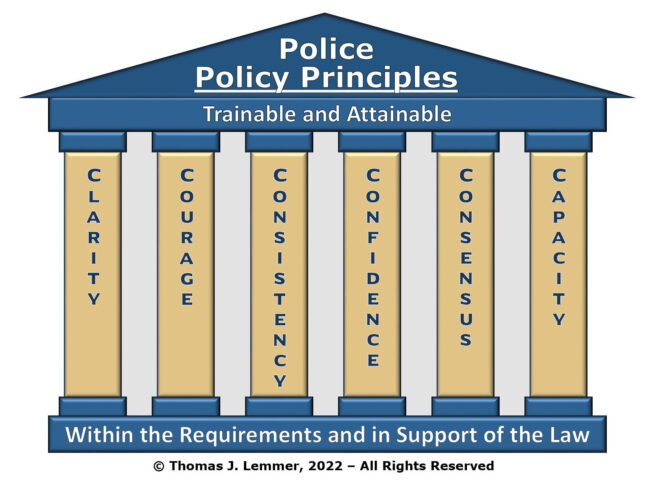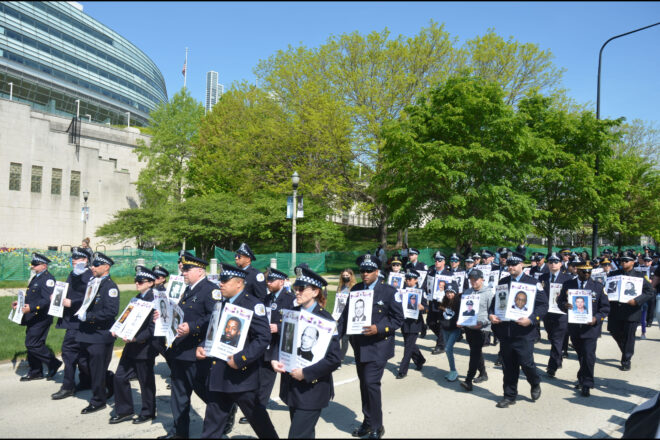Since the Summer of 2021, we have raised the question as to whether Chicago was becoming a Hadleyville. In the 1952 film classic High Noon, the fictional town of Hadleyville was the setting for an epic tale of a broken bond between a community and its marshal. There gunmen openly sought to murder the town marshal, at “high noon,” without any concern the town would stand up in support of the rule of law. Polling this month by the firm Schoen Cooperman Research (SCR) suggests most Chicago voters want greater public safety. That polling is in advance of the 4 April 2023 runoff election for Mayor of Chicago. The polling data also shows most Chicago voters support the Chicago Police Department (CPD).
Estimated reading time: 8 minutes
The Winds of Change in the Windy City?
Earlier this week, the Manhattan Institute (MI) published an interesting article by Jesse Arm on the upcoming runoff election for Chicago mayor. The article was entitled, “Winds of Change in the Windy City.” While based in New York City, MI often carries articles highlighting other major cities with significant problems. As such, articles that feature the struggles of Chicago often appear. Arm’s main conclusion on the SCR polling:
“The results suggest a broad consensus among voters on the Windy City’s poor governance, declining public safety, high concern over crime, the need for more police and harsher punishments for criminals, as well as a positive inclination toward school choice.”
Digging into the Polling Data
Our thanks to MI for posting the actual Schoen Cooperman Research polling data. The poll was conducted this month and gathered the opinions of 600 likely voters for the 4 April 2023 runoff election. The polling approach excluded any voter who worked (or their families worked) for a government agency. So, the poll focused on the opinions of voters who were not police officers or school teachers. The two runoff candidates have supporters who work in government. Paul Vallas has been endorsed by Chicago Lodge 7 of the Fraternal Order of Police. Brandon Johnson has worked for the Chicago Teachers Union and has their endorsement.
Chicago’s Political Leanings
The survey participants, who were neither police officers nor public school teachers, expressed that Chicago remains a Democratic Party stronghold. 72% had a favorable view of President Joseph Biden. 68% had a favorable view of Governor J.B. Pritzker. 69% identified as being a Democrat, and just 12% stated a Republican Party affiliation.
Their Assessment of Public Safety in Chicago
While a Democrat stronghold, surveyed voters expressed deep concerns regarding public safety in the city. Those voters also found outgoing Mayor Lori Lightfoot and current Cook County State’s Attorney Kim Foxx, both Democrats, lacking relative to advancing public safety.
Relative to soon-to-be-former Mayor Lori Lightfoot, 61% of surveyed voters had an overall unfavorable view of her. Mayor Lightfoot’s “very favorable” rating (12%) was three times lower than her “very unfavorable” rating (37%). The sense that Mayor Lightfoot failed Chicagoans relative to public safety during her term was clear in the polling. Relative to public safety specifically, 64% of surveyed voters disapproved of the job the mayor has done in this area. Her “strongly disapprove” rating of her handling of public safety (42%) was nearly three times higher than her “strongly approve” rating of just 15%.
Relative to current Cook County State’s Attorney Kim Foxx, 54% of surveyed voters had an overall unfavorable view of her. The “very favorable” rating for Ms. Foxx (11%) was three and a half times lower than her “very unfavorable” rating (39%). Worse than the same comparison for Mayor Lightfoot. Relative to public safety specifically, 59% of surveyed voters disapproved of the job Ms. Foxx has done in this area. Like the mayor, the “strongly disapprove” rating for Ms. Foxx relative to public safety (44%) was nearly three times higher than her “strongly approve” rating (16%). Additionally, 25% of those surveyed cited Ms. Foxx as the public official “most responsible for Chicago’s current crime wave.” This was the highest blame level among the named officials.
By comparison, despite all the challenges faced by the CPD, the police department was viewed far more favorably by the surveyed Chicago voters. Nearly two-thirds (61%) held a favorable view of the CPD. Whats more, CPD’s “very favorable” rating of 23% was higher than its “very unfavorable” rating of 17%. Neither Mayor Lightfoot nor State’s Attorney Foxx had a higher “very favorable” rating compared to their “very unfavorable” ratings.
The Importance of Public Safety
The survey indicates that among all listed issues headed into the April runoff, concerns about public safety continue to be highest. Fully 54% of the survey participants cited “crime/public safety” as the most important election issue. This rating far outpaced the second most often cited issue of “taxes and spending” (10%).
57% of those surveyed said they feel Chicago is unsafe, including 27% who believe the city is “very unsafe.” More than twice as many believe Chicago is “very unsafe” than feel the city is “very safe.” Just 11% held the “very safe” view. 78% of those polled stated that they believe crime in Chicago is increasing. Just 5% stated that they thought crime was decreasing in the city.
A total of 55% of the respondents have indicated they have considered moving out of the city. This included 31% who stated they have “strongly considered” moving. 50% of those surveyed said that “crime/public safety” is the issue playing the “biggest role” in deciding whether to leave Chicago.
More Cops, Stronger Response to Crime
The survey indicates that Chicago’s likely voters want action on the public safety issue. Nearly three-fourths of those surveyed (71%) want more Chicago police officers. Just 8% said that the city needed fewer police officers. 48% of those surveyed were more likely to vote for a “candidate who plans to hire more police officers” Comparatively, 40% were seeking a “candidate who plans to invest more in social services.”
Additionally, 55% of Chicago voters believe that those who commit crime are treated too leniently. This includes 36% who believe that “punishments” for criminals are “much too lenient.” Just 15% of Chicago voters believe that the punishment of criminal offenders is “excessive.” 80% of those surveyed want stronger punishments for repeat offenders.
The concern about crime extends beyond violent crime. 80% want more arrests and prosecutions for shoplifting, with 54% saying “definitely” so. Also, 90% want more arrests and prosecutions for crimes associated with stealing cars.
Confused Chicagoans
However, slightly more Chicagoans support ending “cash bail” (44%) than oppose (39%) the moves by the Democratic-controlled state legislature and Illinois Governor J.B. Pritzker to greatly increase the percentage of accused criminals released pretrial. Here the survey shows some internal conflict, as more Chicago voters also believe the cashless bail approach will make “our communities less safe.” There the breakdown was 45% believing the approach to bail will make communities less safe, with 39% believing the approach will make the system fairer.
Additionally, while those surveyed want more arrests for crimes like shoplifting and stealing cars, they are also confused about police foot chases. Most criminals will seek to avoid arrest when they have the opportunity. They often run, particularly if they think they will get away. Yet, 53% of those surveyed said they supported the CPD policy created last summer that “prevents officers from chasing people suspected of committing minor offenses on foot if they run away.”
It is not possible to hold offenders accountable who are never actually brought to court. Perhaps many Chicagoans are confused about this reality. Perhaps they want the benefit of holding offenders accountable, but want them to simply agree not to run.
We would encourage Chicago voters to study our founder’s Police Policy Principles. Yes, every policy must be consistent with the requirements of and support the law and U.S. Constitution. It is the first of Lemmer’s principles. Yet, police policy development is a complex issue.
As crafted, CPD’s foot pursuit policy does not meet the requirements of the six policy pillars, consisting of clarity, courage, consistency, confidence, consensus, and capacity. Policies that reduce the capacity of police agencies to meet their public safety mission are not best practice.
Time Will Tell
Time will tell what the voters who actually participate on election day (or more precisely election weeks) decide on who will be Chicago’s next mayor. The SCR poll gives the edge as of this week to Paul Vallas with 44% support, compared to Brandon Johnson with 39% support. Yet, 17% of those surveyed indicated they were still “unsure.” When factoring how those unsure likely voters were “leaning,” the race was placed at Vallas 47% and Johnson 42%. As such, the edge to Vallas held at 5%. With public safety being the focus issue for Mr. Vallas, it would seem he should be able to hold onto that polling edge in this final week before the election.
The voters polled in this survey indicated they do not want Chicago to become a Hadleyville. Yet, some of the policies they support may make enhancing public safety in Chicago more – not less – difficult. Perhaps Mr. Johnson will make use of that confusion to bolster the support for his candidacy.
Not Familiar with the Hadleyville Reference?
We are interested in your thoughts, and invite you to comment below.




Too bad this survey wasn’t out a few years back. It really could have helped out in Chicago.
Perhaps some learning be experience has taken place.
Sir , thank you for the work put into this factual statistically based article . Found it very interesting and pretty much in line with my personal opinion . Chicago voters want a “perfect game thrown everyday by the police” once said a man who’s opinions I respect . The confusion of some voters confuses me . When I pray to my God I seldom think he listens , I’ll have some choice thoughts for him about the upcoming election . I truly believe the future of our city rests in this next election . It’s been an honor serving with you .
Thank you Nick. I am grateful for your service and efforts in defense of our nation and our city. I offer two verses of encouragement:
“And this is the confidence that we have toward Him, that if we ask anything according to His will He hears us” 1 John 5:13.
“and, if My people who are called by My name humble themselves and pray and seek My face and turn from their wicked ways, then I will hear from heaven, forgive their sin, and heal their land” 2 Chronicles 7:14.
The MI survey is further evidence that decades of rule by democrats have created a city where the rights of offenders trump the rights of victims. Legislation from Springfield has tied the hands of police officers and we are now living with the consequences. No cash bail, no vehicle pursuits, no foot chases, unreasonable discipline of police officers… these democrat policies sought to votes, but in the process created lawlessness.
Bad laws, bad policies, bad leadership in places of high office all bring consequences.